- Home
- Michael Crichton
Dealing or The Berkeley-to-Boston Forty-Brick Lost-Bag Blues Page 8
Dealing or The Berkeley-to-Boston Forty-Brick Lost-Bag Blues Read online
Page 8
A rough and tough cop he could be, and for that he would be hated and respected. But as a thief with a badge, a guy who broke the rules and regulations we all play by, as that kind of person he could never last.
At least, everyone hoped not.
21
I WALKED OUT INTO THE Berkeley sun and stood there, just soaking it up. The light hurt my eyes at first and I sneezed and rubbed my nose.
“Gesundheit,” said a voice behind me.
I turned and she was in my arms, crying, kissing me and crying.
“Hi,” I said. It was happening very fast, all of it.
“What did they do to you?” she said.
“Nothing. Punched me in the cubes some. That seemed to be about all they knew how to do.” I laughed. Getting punched in the chops suddenly seemed absurd.
“Oh, my poor Peter,” she crooned, stroking my head.
“Umm,” I said, thinking, It was worth it just to feel this.
“My poor, poor Peter,” she went on. “You didn’t have to do all that.”
“What’dya mean?” I laughed. “I didn’t think I had much choice in the matter.”
“No, for me,” she said.
“Oh, Christ, forget it. One bail is better than two any day.”
“My poor Peter,” she said again, and kissed me.
My rented car was over in the lot. I had the keys back; we went and got into it.
“The hearing is set for tomorrow,” she said. “Did they tell you?”
“More or less,” I said. I started the car and drove out of the lot, not exactly sure where I was going. I wanted to go to a beach somewhere. A quiet beach.
“Hi,” she said, and grinned broadly this time.
We were off.
As I drove I said, “Who paid my bail? Musty?” I would have to wire home for some bread to pay him back. That was good of him. The last time I sat in there until I almost rotted, waiting for somebody to come up with a lousy fifty dollars.
I looked over at her and she was smiling. “What’s so funny?”
She just shook her head.
We crossed the Richmond Bridge, and then went through the hills, coming finally to the summit and turning right down an old farm road. The sea was visible from the road but we had to go way down, past miles of grazing land that stood between us and the cliffs down to the water. When we finally got down to the beach, it was deserted.
“Great beach, huh?” I said, but she was already out and running down the sand. It was almost a joyful run, but not exactly. I ran after her and caught her. The sun overhead was fierce and bright.
“Hey,” I said. “Who paid my bail?”
She just smiled.
“What’d you do a thing like that for?”
She shrugged. “It seemed like a good thing to do with the money.”
“Seriously,” I said. I was suddenly in a serious mood. “Why?”
“I don’t know.”
“Seriously.”
“It’s a great mystery,” she said and giggled, broke free and began walking down the beach. I walked after her.
“Didn’t they tell you that they don’t give it back?”
“I know,” she said.
“Well, why?”
“Don’t get frantic.” She kicked the water as it slid up the sand. It sparkled off her feet, into the air, then splattered down onto the sand.
“I’m not frantic. I just want to know.”
“You’re making such a big deal out of it.”
“I’m not.”
“Yes you are.”
And she giggled and started running again, and I chased her, and it all began to seem ridiculous. She was right; I was making a big deal out of it. I finally caught her and tackled her and she laughed very loud beneath me.
“That was a very nice thing you did for me,” I said.
She kissed me, pulled me down hard. “You bet your ass,” she said.
Very stoned, sitting on the beach just back far enough from the water so the sand was dry and still warm from the setting sun, watching the water hiss up toward us. She said, “I can’t get me out of your mind.”
I knew what she meant.
22
WALKING DOWN WHAT SEEMED LIKE miles of endless corridors, our footsteps echoing, I said, “I’m surprised you have a key.”
She laughed.
It was close to midnight, and the building around us was silent. The walls were painted light green, a little like jail; the building reminded me of an institution. “It used to be welfare offices or something,” she said, “before it was sold and converted.”
“Cheery,” I said.
“It gets better.”
As we passed them, she showed me the lounges for the performers. They looked like airport lounges or something, sort of plush but impersonal. Very soundproofed. I suddenly began to notice how everything off the corridors was soundproofed.
Then we came into another room, marked STUDIO A. Shock: it was like a heavy living room. Persian carpets on the floor, hangings on the walls, colors and textures. “Like a very nice cathouse,” I said.
“Close,” she said. And out came another joint. She lit up as I wandered around the room. There were microphones everywhere, and a stand for guitars, and a piano in the corner. I sat down at the piano.
“Do you play?” she asked.
I shook my head.
“You play anything?”
I shook my head, and plunked out “Chopsticks.” She laughed, and then said, “Stay there,” and left the room. I walked around, breathing in the luxury, and then began to drift into the sense of working with my group, the cigarettes and the quiet talk and everybody getting together, getting their heads and fingers loosened …
“Hello,” she said. Her voice was funny. I turned around and saw the drapes pulling back to reveal a glass wall, and her behind the glass, staring in at me. The lights in the other room were overhead, harsh and funny. I could see the room was filled with recording equipment, decks and spools and dials and consoles; she was wearing earphones. A flash on the mechanical sense: there was money in all this, and manufactured products, industry just like everywhere else. The flash faded. She made a gesture for me to go toward the microphone.
I tapped it. “Is this thing working?” I heard my own voice, from speakers mounted somewhere in the room. It was working.
“We, uh, just want to play a few numbers that we know well, because we’ve never played together before.”
She knew where that line came from, and she smiled. I began to get into it.
“My name is, uh, Lucifer Harkness …”
Something happened. The voice was warbling as it came back to me. She was flicking buttons. I laughed. “What’re you doing to me?”
Now it was echoing, Doing to me, to me, to me, me.
“Yeah, well, actually …”
This time it was thin, high, squeaky, if your memory served you well. It startled me. “This is getting to be a drag,” I said. I wanted to play something, now was the perfect time to be able to do it, but I didn’t know how. It was finally hitting home, the foolishness of it, that I couldn’t even do simple chords on a guitar, I couldn’t do anything. Hopeless. I began to get depressed, and she must have sensed it, because she suddenly came around, opening the studio door, and led me out of there.
“It’s because the place is deserted,” she said. “Empty buildings are always depressing.” She smiled and squeezed my hand.
23
SHE CAME TO THE HEARING with me. I had a clean shirt and tie and I stood up straight for the judge. She sat in the back of the hearing room; I glanced back once to look at her.
The judge asked me if my legal rights had been properly attended to, since I didn’t have a public defendant by my side. I didn’t mention to the judge that I’d been through that whole riff before and it was a drag, because the P.D. doesn’t give a screw about what happens to you, he just wants to look good in front of the judge. So I told the judge that everyt
hing had been taken care of, but that in this instance I preferred to defend myself. The judge looked a little amused and a little pleased at that, and told me to proceed.
My defense was pretty weak, but logical. It included such helpful hints as the fact that I was scheduled to leave California the next day, providing I didn’t get hung up in jail and cost the good taxpayers additional expense. I also said that I had no relationship with the primary defendant in the case, i.e., the lid of dope, and that I considered it a freak accident that did not merit my bearing the weight of its consequences any more than I already had.
The judge replied that I had a sharp, clever, and discerning mind, but that I obviously knew nothing about the law. Which, he added, meant nothing, since all charges had been dropped by the D.A.’s office, and if I would speak to the clerk before leaving the courtroom, I was free to go.
I was pleasantly dazed. I thanked the judge, who told me not to thank him, and I left.
Sukie laughed as we walked out the door.
24
THE NEXT DAY WE WENT up to Tilden, very early, to watch the sun come up over the Bay. It was cold and dark when we arrived, and we huddled under a blanket drinking Red Mountain and feeling the dry warmth spread outwards. From the top of the ridge you could see everything, Oakland and Berkeley below, and Richmond and Mt. Tamalpais in the distance.
Around six-thirty some freaks showed up and did a dance to greet the morning, while the mists slowly disappeared below and the sun spilled across the Bay. And then suddenly it was time to leave, to return to the world of cars and sewage systems and plane schedules and Burger Kings. We went directly to her room and got in bed, blowing dope and drawing each moment out, as if we could forestall evening.
Late in the afternoon I went downstairs to find Musty, who was in the kitchen, where I’d first seen him. He was drinking jasmine tea, smoking a butt, and selling a couple of bricks to a fantastic-looking thirty-five-year-old chick. The chick split when I showed, taking the bricks with her in an alligator handbag.
“You see?” Musty said, as she left. “All types.” Then he grinned. “Look at the ass on her. Beautiful.” He sighed, got up, and brought out my ten bricks. “Listen man,” he said, “I’m sorry about Lou. He’s a little speedy, you know. Bad scene. Does up three bags a day.”
“What the hell,” I said, feeling magnanimous. “Past tense.”
Musty glanced at me as he set the scales on two pounds even and weighed the bricks, one by one. “You’re a good head, Harkness,” he said. “I can dig why Sukie balls you.” I didn’t really feel like talking about that. “Got a knife?” he said.
I gave him my Swiss Army job and he sliced the bricks open. They cut clean through, no rocks, no clay, practically no sticks. They were righteous keys, all right. “Dig the way the blade goes through?” he said. I nodded.
I’d already tasted the dope, so there was nothing left to do but soak the bricks in Coca-Cola for a minute, so they wouldn’t smell too bad, and wrap them up. Then into my aluminum-lined suitcase and do up both sets of locks. The ten bricks fit very nicely without shaking or banging when I picked up the suitcase.
Musty held out a hand. “Be cool,” he said, “and say hello to John for me.”
I went back down the hall, heading for the staircase to say goodbye to Sukie. I dreaded going up those stairs and then down again, but I found her standing in front of the door, raincoat over her shoulder.
“I’ve got to drop the car at the airport,” I said.
She nodded.
“How’re you going to—”
“Don’t worry about it,” she said.
I already had my ticket, so when we got to the airport we just stood around and made each other uncomfortable until they announced boarding for my flight. I kissed her quickly. We were standing underneath a billboard that said GET AWAY FROM IT ALL. I considered taking a later flight and calling John to say I’d gotten stuck in traffic, but the truth was that the East was seeping back into my brain again, the East and Boston and wet roads and hour exams. I knew I had to go.
She kissed me again. “Will I see you …” She stopped.
“Sure,” I said, squeezing her. “Sure, of course you will.” I was definitely getting back into my Eastern frame of mind, I realized, complete with an enormous paranoia about departure scenes and weeping chicks.
“When will I see you?” Very calmly. At least she was calm.
“I don’t know. Soon as possible. I don’t know.”
“I never write letters,” she said, not letting up. All I could think was, Why do they always have to do this?
“Neither do I,” I said. Which was not completely true. I write them and never mail them. “But I’ll call.”
“Will you?” Pleased.
“Yeah, soon as my exams are over.”
“Tell me what day?” Still pleased.
“I don’t know what day. Soon.”
“Okay,” she said, subdued, and then they were announcing the final boarding call for my flight, and I hustled for the plane.
She said she’d watch my plane from the observation deck, but by the time I was buckled in at the window the sun was almost gone and I couldn’t see her at all.
2
Fattening Frogs for King Snakes
It’s so sad to be lonesome
And it’s too much unconvenient
To be alone …
SONNY BOY WILLIAMSON
25
AT THE AIRPORT THE CROWDS of screaming fans were lined up to greet the sensational new rock sensation Lucifer Harkness and his greasy back-up group, The New Administration. Harkness stepped off the plane, resplendent in velvet bellbottoms and a black leather T-shirt; from behind thick purple shades he could see the crowd going wild. They broke through the cordons and fought off the cops and ran screaming for him.
He felt a thousand hands touching him, clutching at his clothes, tearing them off his back, covering him with kisses, biting his neck affectionately, pulling at his balls, and it was delirious and wonderful for several minutes before the cops came down on the kids and broke it up, and Reggie Thorpe, the manager, got the group together and into the waiting Rolls.
As the Rolls pulled away there were hundreds of screaming teenies all lined up on the road out of the airport. Some of them threw themselves in front of the car, stopping it, while others scratched at the glass and kissed it, screaming, “We want to ball Lucifer, we want to ball Lucifer.” And Lucifer was thinking to himself about what an unbelievably tedious chore it would be to crack all of those hundreds of green young cherrystones, when the guy sitting next to him jabbed him in the side.
“Hey, lookit dat, buddy. Nice pussy.”
I politely looked over a ham-sized forearm to see a thin, wasted-looking chick with a shaved twat lying guilelessly across the centerfold page of Suburban Jaybird.
“Nice,” I said. Nice, my ass. The chick was about as ugly as they come, especially without her hair. Hair was mystery, it was sex, it was funky and greasy and it got tangled when you made love.
“How’dja like to fuck her?” he said, holding up another picture.
I shrugged. The woman behind us on the MTA car was doing her best to let us know that she was faint with indignation. She was making small coughing sounds. Out the window, gray and rainy, was the Boston skyline.
“I like ’em with hair,” I said. Behind me I heard the sharp intake of breath from the woman.
My companion turned around and shot her a cold look, then turned back to his magazine. “Holy Jeez,” he said in a reverential tone. “Lookit, there’s one you’d like.”
“Yeah,” I said. “Now there’s a nice bush.”
“Christ, you’re not shittin’,” he said.
He got off at Park Street, leaving me alone with Mrs. Snorts behind me. She got off at Charles Street, the Beacon Hill exit. I took the subway all the way to the end of the line.
26
SHOOTING OUT INTO HARVARD SQUARE from the bowels of the MTA was
about as much fun as having a tooth pulled without Novocain. I always felt that way when I got back from the Coast, but somehow I was never prepared for it. Because, as much of a drag as I knew it would be to return, I always figured that it would be nothing more than that—a return. And so the ensuing culture shock, the numbing of mind and body which was only later understood to be Boston’s charming way of saying Welcome Back, always caught me by surprise.
And what a surprise. A surprise wrapped in thick, heavy air, dimly opaque light, trimmed with an ineffable, oppressive sense of guilt. The air in the square reeked of guilt. Nobody was ever going to be naive enough to mention it, but it was there just the same, and readily assented to by all on the street.
The street. White pasty bodies and zitty faces shuffled past me, eyes on the ground, clutching cigarettes like drowning men, moving only when the sign commanded them to WALK. Old ladies sneered at passersby and cabbies looked hot and sullen. Three-pieced professors sneaked across the street, clutching their top-heavy wives like illicit Government secrets, and paranoid pristine fags marched poodles past shattered winos bumming dimes. Truck drivers whistled at towny cunts and sad, stooped teaching fellows picked their noses and read the Daily Flash in twenty-three languages.
I went across the street to Nini’s to get some cigarettes, and cut my way through the prepubescent mob outside. The guys slouched against the walls, sucking on toothpicks or nicotine sticks, scratching their crotches stealthily and yelling at the chicks. The chicks were all over the place, big flowsy broads topped by bleached, ironed hair, chewing the life out of huge wads of gum and swinging their pocketbooks at the more adventurous guys. All the time shrieking like cats in heat, shrieking and laughing and again swinging their pocketbooks. It was too much.
Inside Nini’s the adults-only version of the same movie was going on, featuring fat, powdered women, engrossed in multicolored tabloids (“I had a change-of-life baby by another man!”), and the usual mob of skinny, haunted men in the back of the store, tirelessly leafing through the skin mags. Jesus, what all these poor bastards needed was a good lay. And a good lay they’d never get—not in Boston, anyway.

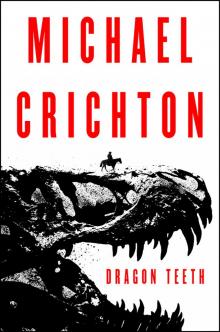 Dragon Teeth
Dragon Teeth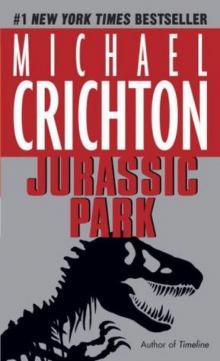 Jurassic Park
Jurassic Park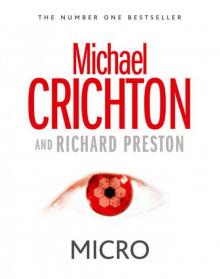 Micro
Micro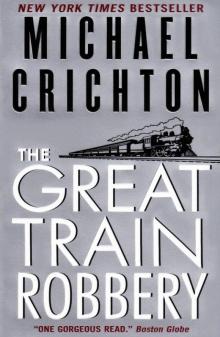 The Great Train Robbery
The Great Train Robbery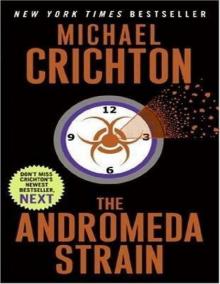 The Andromeda Strain
The Andromeda Strain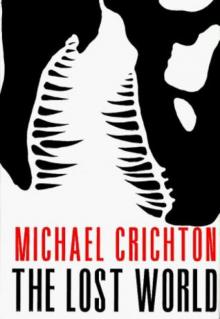 The Lost World
The Lost World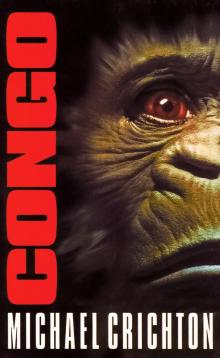 Congo
Congo Travels
Travels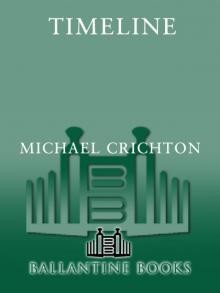 Timeline
Timeline Sphere
Sphere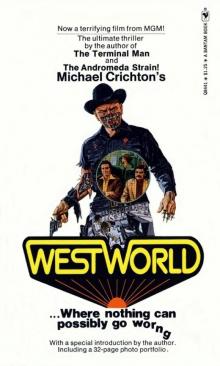 Westworld
Westworld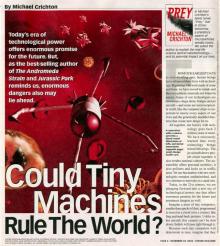 Prey
Prey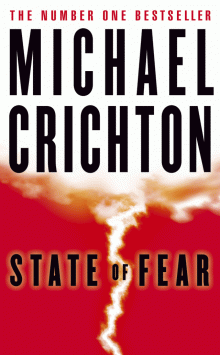 State Of Fear
State Of Fear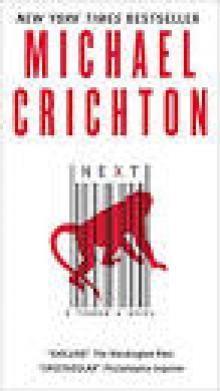 Next
Next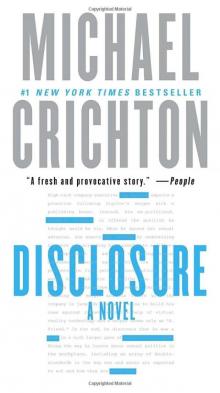 Disclosure
Disclosure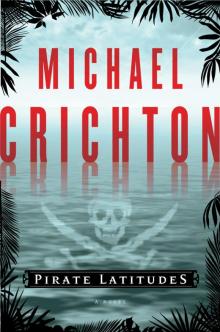 Pirate Latitudes
Pirate Latitudes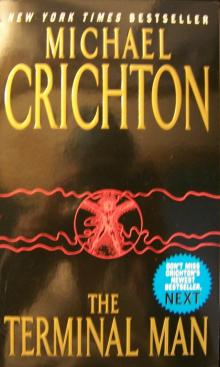 The Terminal Man
The Terminal Man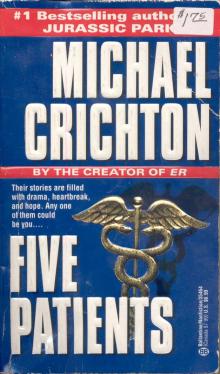 Five Patients
Five Patients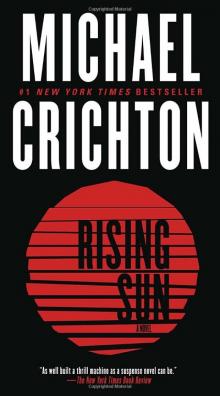 Rising Sun
Rising Sun Binary
Binary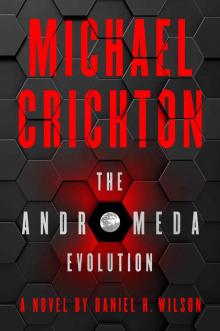 The Andromeda Evolution
The Andromeda Evolution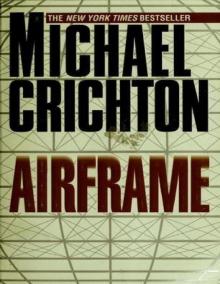 Airframe
Airframe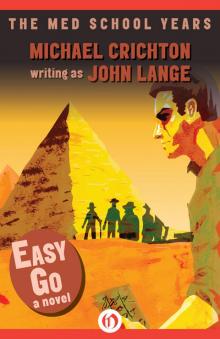 Easy Go
Easy Go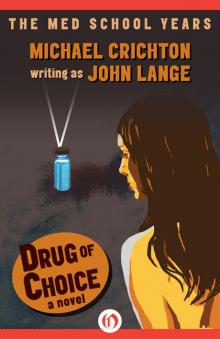 Drug of Choice
Drug of Choice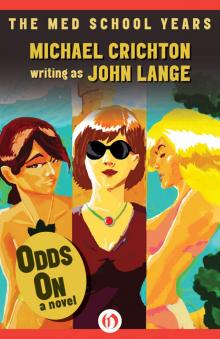 Odds On: A Novel
Odds On: A Novel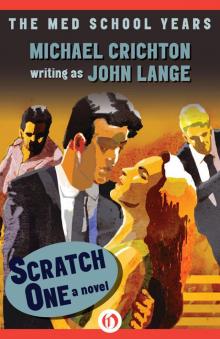 Scratch One
Scratch One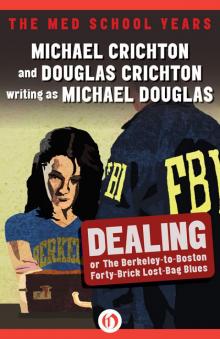 Dealing or The Berkeley-to-Boston Forty-Brick Lost-Bag Blues
Dealing or The Berkeley-to-Boston Forty-Brick Lost-Bag Blues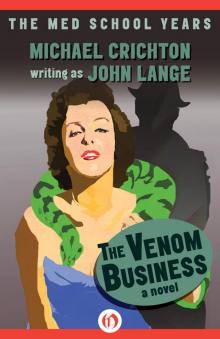 Venom Business
Venom Business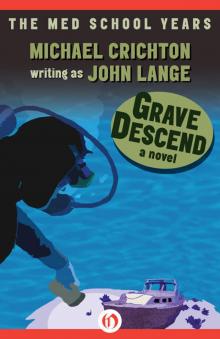 Grave Descend
Grave Descend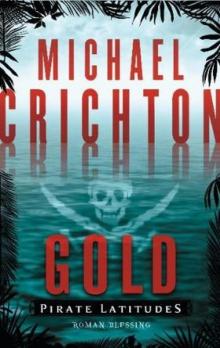 Gold - Pirate Latitudes
Gold - Pirate Latitudes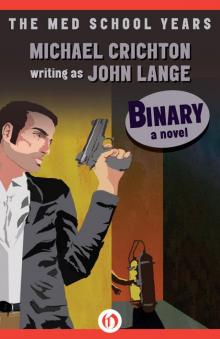 Binary: A Novel
Binary: A Novel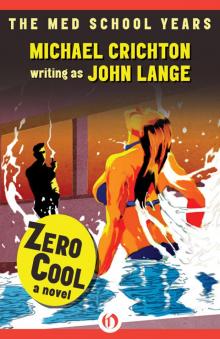 Zero Cool
Zero Cool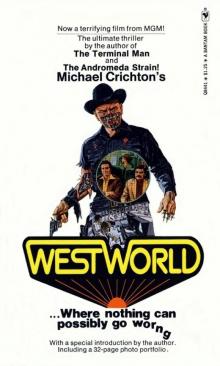 Delos 1 - Westworld
Delos 1 - Westworld